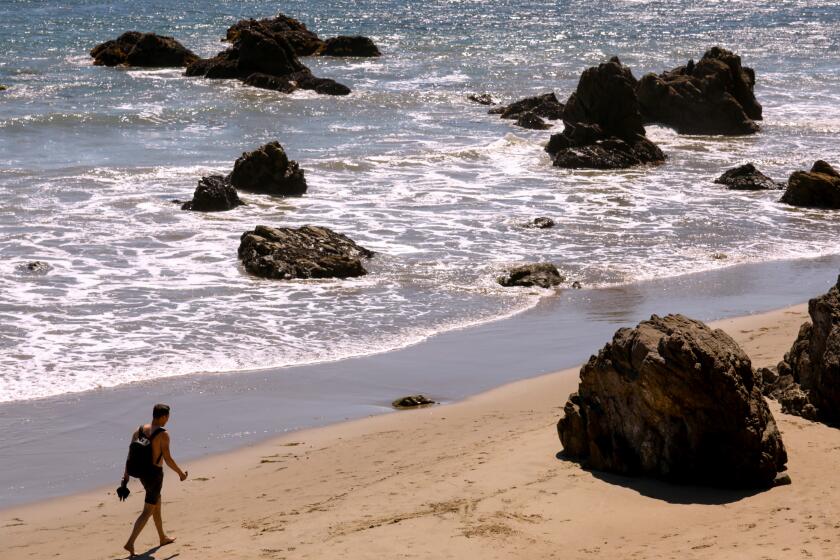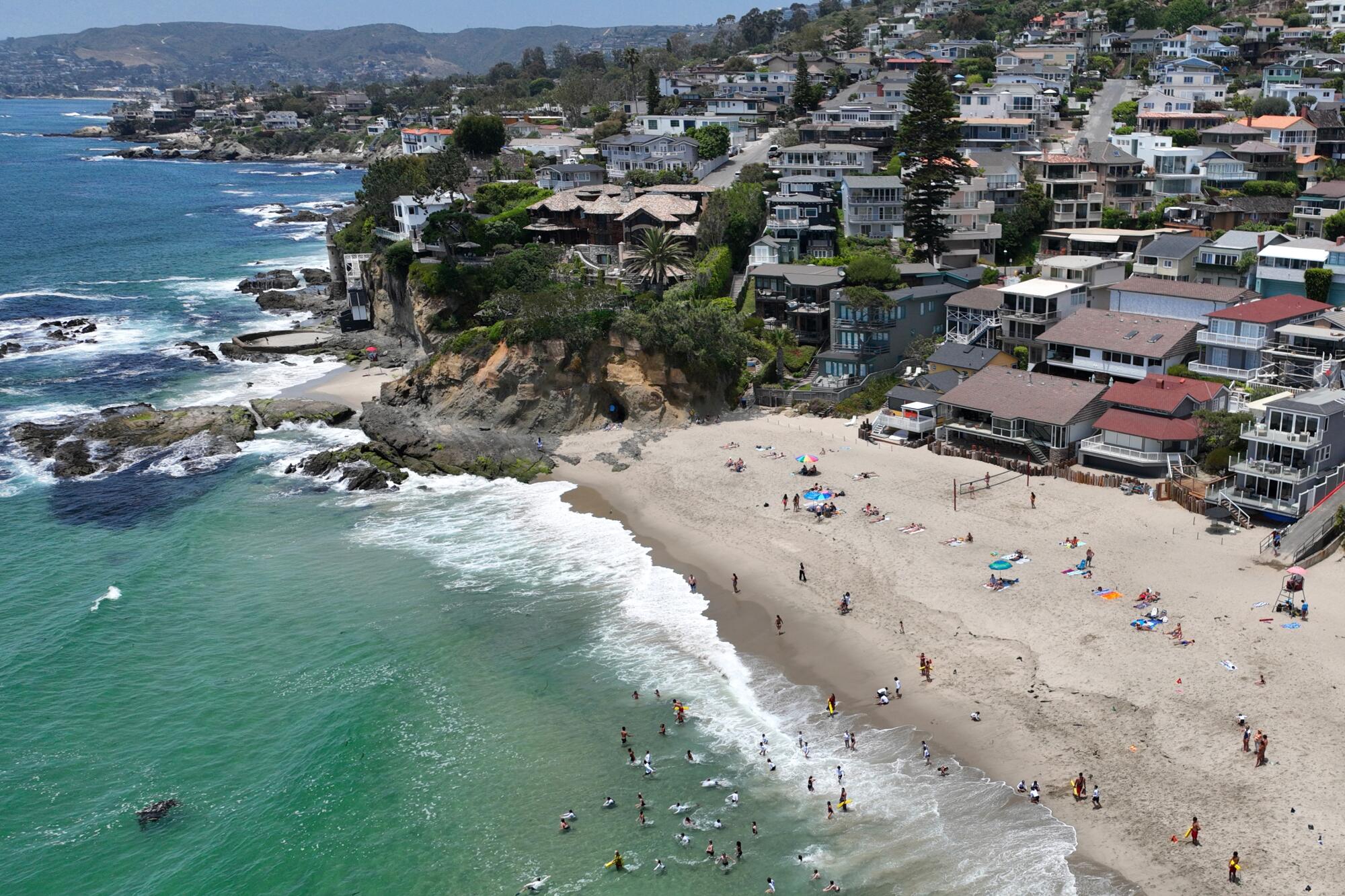
The summer sun was just beginning to peek over the stately bluff-top homes that overlook Aliso Beach, but Greg Viviani had already embarked on a most unpleasant scavenger hunt.
He moved quickly, scanning the white sandy shore — a terrain he’s known since childhood. “A straw,” he called out, snapping up the tiny yellow plastic piece with his trash picker. “Look at this.”
Viviani identified the debris scattered along the shore as he found it: a new pair of Crocs, cigarette butts, edges of chip bags, shoe laces, tissues buried in the sand, bottle caps, an empty glass bottle of green apple flavored Smirnoff Ice. And so much plastic.
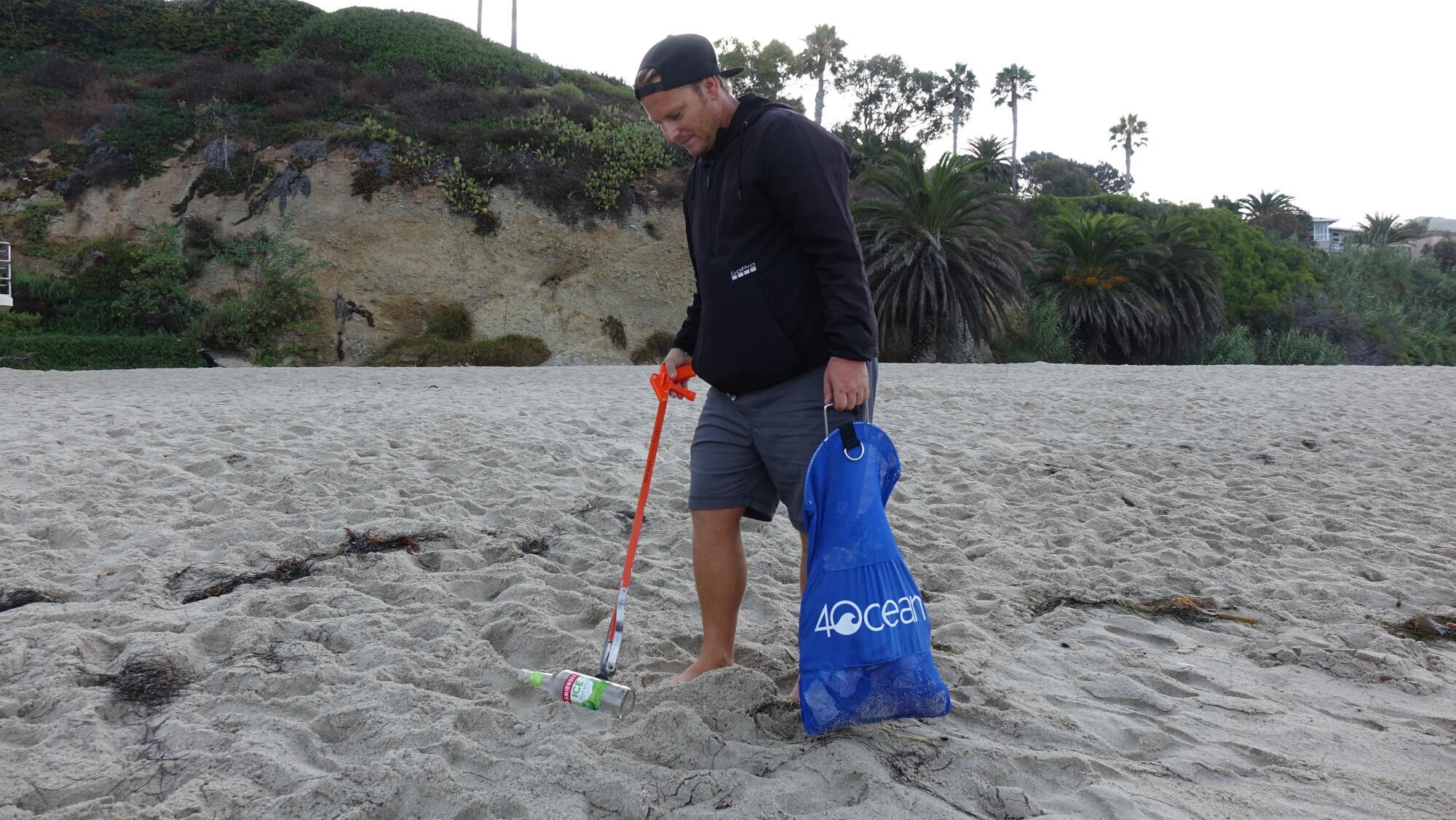
His most unusual find? A sex toy abandoned in the sand, he said.
Each item he grabbed was met with an exasperated sigh as he shoved it into a reusable bag to haul to the trash. After an hour, the bag was full. But his work wasn’t done.
Just steps from the exclusive Montage Resort, where an ocean view room costs upwards of $1,000 per night during the summer, waste was overflowing from trash cans on Treasure Island beach. A colony of seagulls battled over a Costco rotisserie chicken carcass. Resort employees continued past the mess to set up white beach chairs and umbrellas on the sand for guests.
“It never ends,” Viviani lamented. “You can clean it all up in one day and it’ll be covered with trash tomorrow.”
Laguna Beach residents have for months been pushing city officials to get a handle on what they call “destructive tourism” that sweeps through the small beach town every summer. The crowds started to increase in 2020 at the beginning of the pandemic, when people itching to get outside flocked to the beach in search of a safer way to congregate. Residents say it hasn’t slowed down much since.
Officials this month formed a committee dedicated to addressing visitor issues and launched an ad campaign on Google to target misbehaving tourists. The ads, which will run for the rest of the summer, focus on residents’ most common complaints, including litter, cigarette smoke and loud vehicle exhaust.
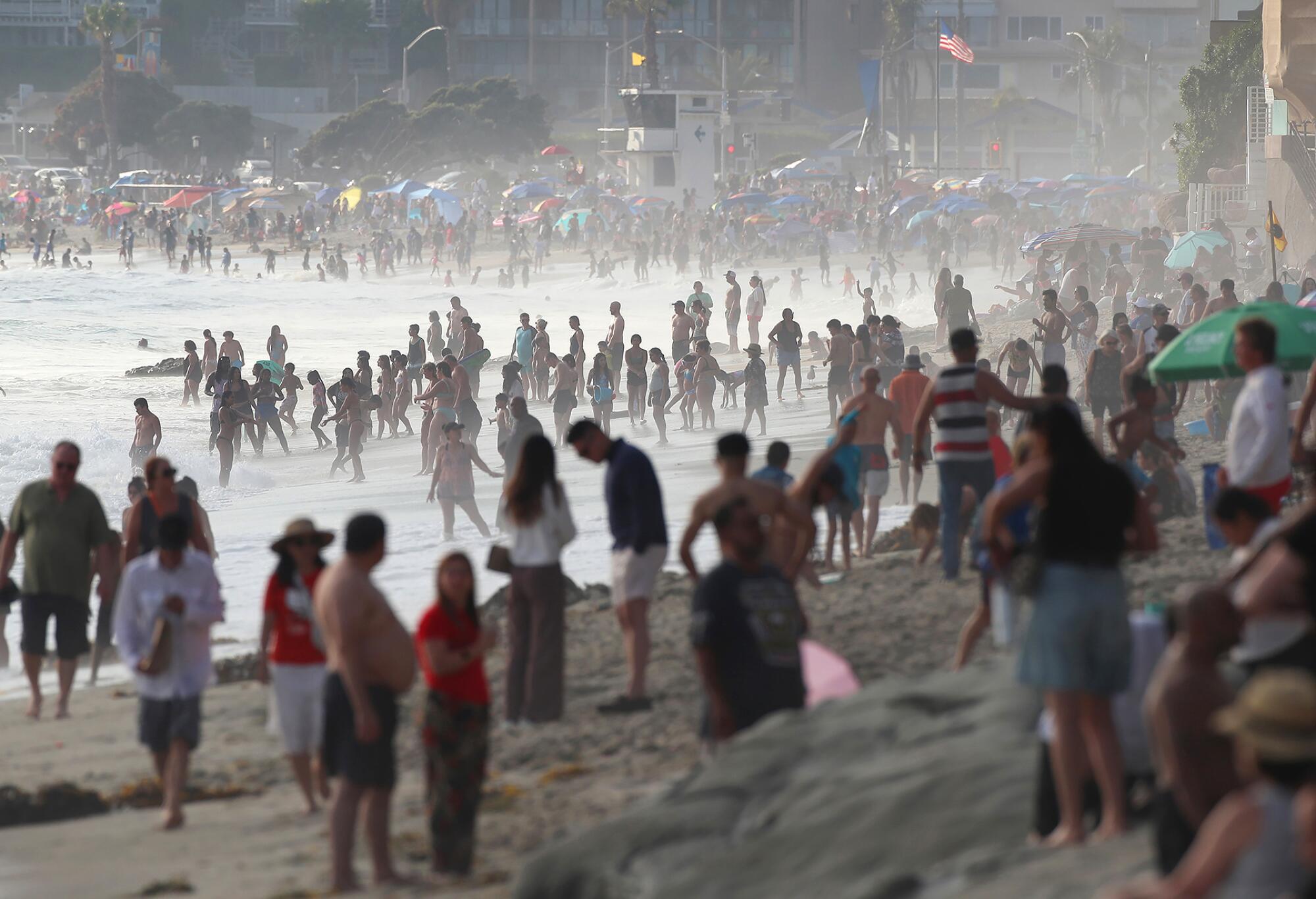
The crush of sightseers, known as overtourism, has grabbed headlines across the world. In Venice, Italy, officials this year launched a pilot program to charge day-trippers a 5-euro (about $5.50) entry fee that authorities hope will discourage visitors from arriving on peak days. Last month in the Spanish city of Barcelona, protesters armed with water pistols marched through the city spraying tourists and yelling “go home.”
Other coastal California cities are also seeing a surge in visitors as people living inland seek refuge from sweltering temperatures. But Laguna Beach’s geographic constraints, including few roads in and out of town and narrow beaches, exacerbate the problems, according to residents. They fear the issues will only worsen as summers get hotter.
“I know we’re all very protective of our community, but we’re getting this everywhere, and I don’t think we can necessarily expect it to change because it gets hot inland and people just pour in here,” Mayor Sue Kempf said at a recent council meeting. “It’s a problem.”
The 5-euro or $5.36 entry fee, authorities hope, will discourage visitors from arriving on peak days and make the city more livable for residents.
Laguna Beach has been a popular destination for decades, with its iconic rocky coastline, scenic coves and artsy village atmosphere. In the mid-2000s, people descended on the city hoping to experience some of the same picturesque locations they saw on the reality TV show “Laguna Beach: The Real OC.”
Social media has only accelerated the city’s popularity as an upscale slice of paradise. On Instagram and TikTok, visitors post stunning photographs of crystal-blue waves and a shoreline that looks like the cover of a California postcard.
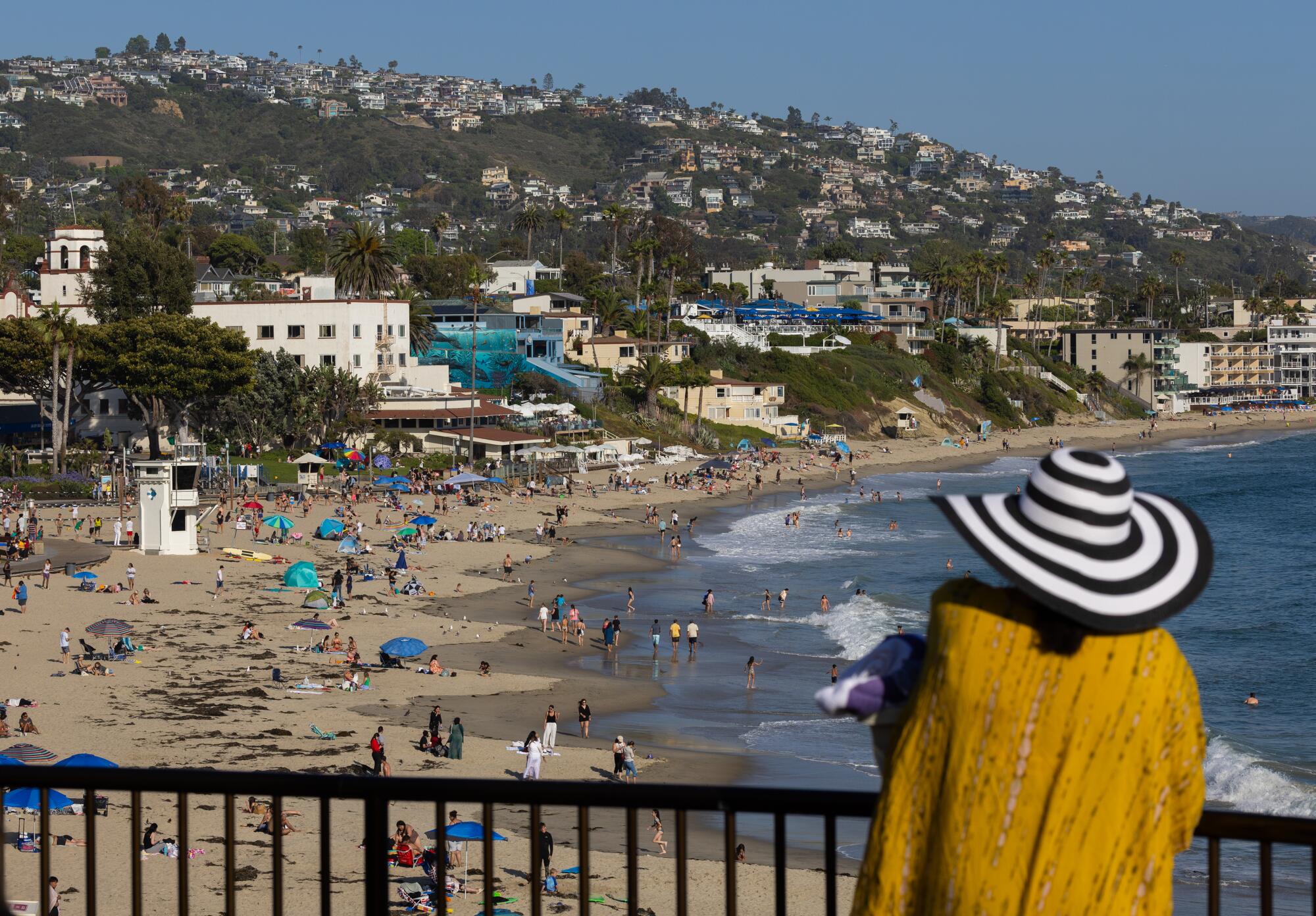
Tourism has long been an economic engine in Laguna Beach, which sees about 6 million visitors annually. But residents say the challenges have begun to outweigh the benefits, mostly because not everyone is clear about the rules at the beach. For example, they’ve witnessed people wading into the water in the tidepools, a sensitive habitat that’s home to a variety of sea life, including octopus, urchins, sea stars, crustaceans and small fish.
Jinger Wallace, co-founder of the Laguna Bluebelt Coalition, said the city needs additional enforcement personnel and tidepool educators to help protect sensitive habitats.
“It’s a privilege and responsibility to protect Laguna’s sea life after decades of overfishing and pollution,” she said. “[T]rash, careless damage to tidepools and unnecessary discharges of urban runoff ... each one of us has a responsibility to solve these challenges.”
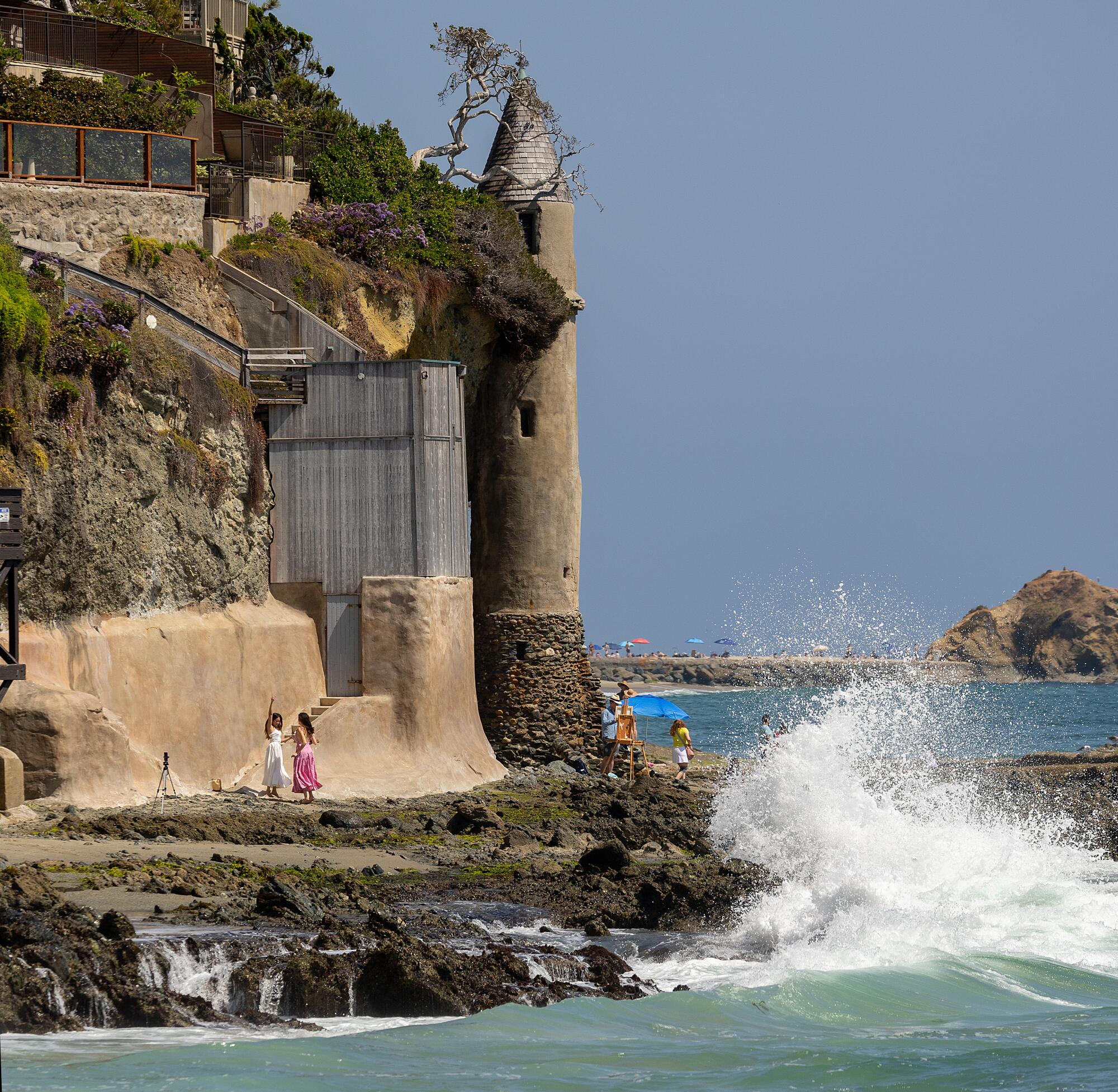
For months, Laguna locals have lined up at City Council meetings urging officials to do something to address the challenges brought by daytrippers. Many have urged staff to write more tickets for illegal activity, such as smoking, drinking alcoholic beverages in public, littering and bringing pop-up canopy tents taller or wider than 6 feet onto the sand.
The influx of visitors is also taxing resources. The number of ocean rescues since Memorial Day is up 400% compared to last year, officials said. Lifeguards pulled 2,200 people from the water over the Fourth of July weekend.
The tension between residents and visitors in Laguna Beach has reached a boiling point. In July, a homeowner was filmed in a TikTok video screaming at a group of beachgoers at Victoria Beach.
“Get f— moving,” the woman screamed at the group, which included a child, as she unspooled rope to cordon off a section of sand. “I’m not joking around! It’s not harassment on the beach, it’s harassment in my whole property. Get out of here! Now!”
The 1976 California Coastal Act gives residents a fundamental right to the state’s beaches. But the public doesn’t have the right to all of the sand.
The California Coastal Commission sent a notice of violation to the homeowner — and her neighbor — this month, warning that they must remove the ropes, which are considered unpermitted development. The notice also stated that unoccupied beach furniture in the public access easement created the “incorrect impression that the entire area surrounding the obstructions is private property without public access.”
Many residents were quick to distance themselves from the viral video, saying that they’re not trying to restrict access to the coast.
“The beach is for everybody,” Viviani said. “But we want people to respect the community and help out. If you see trash, don’t walk by. Pick it up and throw it away. We can all make it more beautiful so it’ll last for generations to come.”
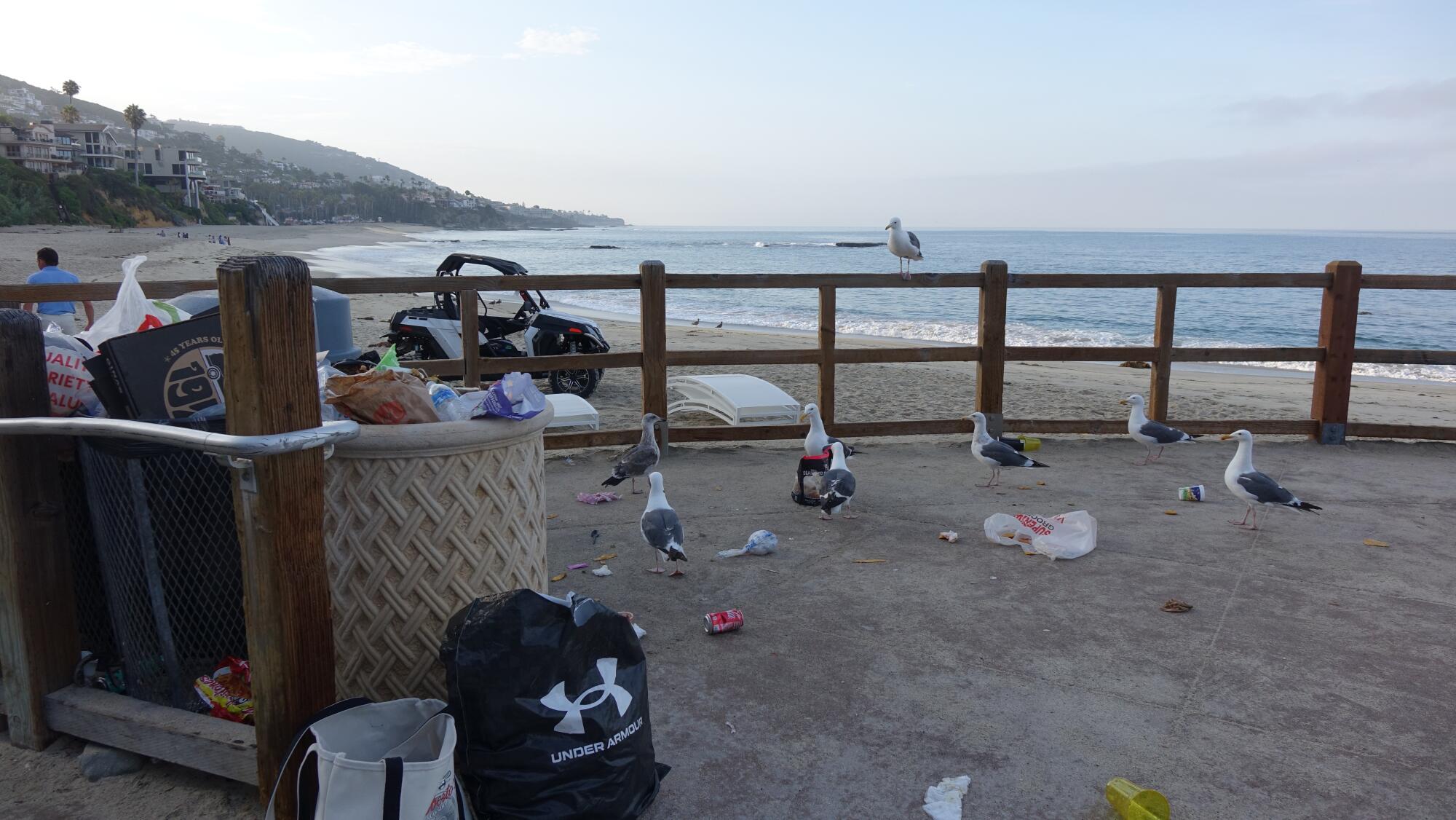
On a recent Sunday afternoon, temperatures were in the 80s in Laguna Beach and the parking lot at Aliso Beach was jammed. Cars circled through the small space, waiting for a spot, and traffic spilled out onto Coast Highway. Some abandoned the lot and left their cars in red zones along Coast Highway, the main artery through town. Traffic leading into and out of the city was bumper to bumper.
Beachgoers who parked in neighborhoods jaywalked through a sea of cars across the highway to the sand. There, visitors were met with a sea of tents and umbrellas. Families sat on towels watching as skimboarders charged into the frothy surf to catch a wave. At one point, a park ranger walked across the sand to chat with a group of beachgoers who had brought alcohol, which isn’t permitted on most California beaches, including in Laguna.
Laguna Beach woman who was filmed yelling at beachgoers to get off ‘her property,’ reportedly targeted by California Coastal Commission.
Joanne McMahon spent years taking her children over a pedestrian bridge that leads from her neighborhood to the beach. Last time she stepped onto the sand at Aliso Beach, she was overwhelmed by the crowd. Nearly every inch of shore was taken. She stopped going, she said.
“I feel like we’re promoting tourism to the point of just over impact. Why do we need to continue to promote this for visitors? We can’t handle what we’ve got now,” she said.
McMahon, who has lived in Laguna Beach since the late 1980s, said she watches people race down Coast Highway, making illegal U-turns in the middle of the highway and speeding out in front of traffic.
“It’s a slice of heaven,” she said, “and it’s getting really crappy.”
More to Read
Sign up for Essential California
The most important California stories and recommendations in your inbox every morning.
You may occasionally receive promotional content from the Los Angeles Times.

